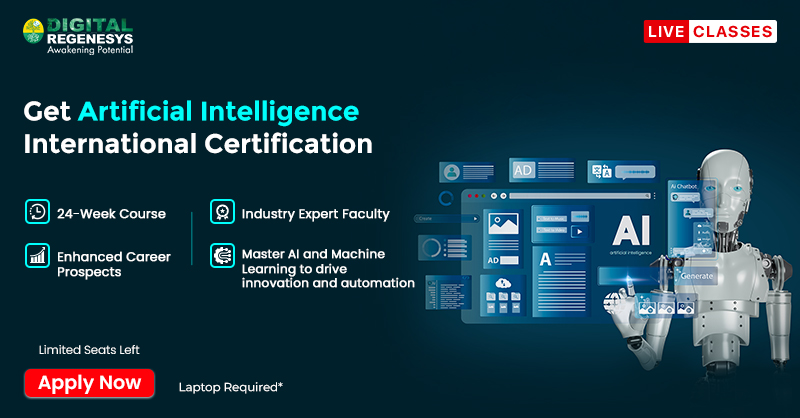What is Cloud AI? A Beginner-Friendly Guide

Imagine having the power of artificial intelligence at your fingertips, without needing a supercomputer or complex setup. That’s precisely what Cloud AI offers.
By hosting AI tools and services on cloud platforms such as AWS, Google Cloud, or Microsoft Azure, Cloud AI enables businesses and individuals to easily and efficiently access, build, and deploy intelligent applications.
For beginners, it may seem like a complicated buzzword, but at its core, Cloud AI simply means using AI through the cloud. Whether it’s automating tasks, analysing massive amounts of data, or powering smart apps, Cloud AI is making advanced technology accessible to everyone.
In this article, we’ll break down what Cloud AI is, why it matters, and how you can start using it – even if you’re just getting started.
What is Cloud AI?
Cloud AI refers to artificial intelligence services and tools hosted on cloud platforms, making AI accessible without the need for expensive hardware or complex local installations. It combines the processing power of cloud computing with AI capabilities, including machine learning, natural language processing, and computer vision.
This allows businesses and individuals to experiment, build, and deploy AI applications at scale.
By leveraging Cloud AI, organisations can reduce infrastructure costs, accelerate development, and focus on innovation rather than hardware management.
Key features of Cloud AI include:
- Hosted on Cloud Platforms: No need for local servers or infrastructure.
- Accessible via APIs and Web Interfaces: Use AI tools without complex setup.
- Supports Multiple AI Capabilities: Includes machine learning, NLP, computer vision, and more.
- Flexible Resource Management: Scale computing power based on project needs.
- Integration-Friendly: Easily connects with other cloud services and applications.

Key Benefits of Cloud AI
Cloud AI simplifies the deployment of artificial intelligence and enhances efficiency across various business functions. By centralising AI resources in the cloud, organisations can leverage flexible computing power, access pre-built AI models, and scale operations seamlessly. For beginners, Cloud AI offers a low-barrier entry into advanced AI experimentation, enabling hands-on experience with real-world applications.
Benefits of Cloud AI include:
- Scalability: Handle large datasets and spikes in demand effortlessly.
- Cost Efficiency: Pay only for what you use, avoiding expensive infrastructure.
- Faster Deployment: Quickly build, train, and deploy AI models.
- Accessibility: Use AI tools through web interfaces or APIs.
- Automatic Updates: Platforms continuously maintain and update AI services.
Read about the Role of AWS in AI/ML.
Practical Applications of Cloud AI
Cloud AI is no longer a futuristic concept; it’s powering numerous real-world applications across industries. From healthcare to finance, education to retail, Cloud AI enables faster decision-making, smarter automation, and improved user experiences.
By leveraging AI in the cloud, businesses can process massive amounts of data, uncover valuable insights, and enhance operational efficiency without incurring significant hardware or infrastructure costs.
Common Cloud AI applications include:
- Chatbots & Virtual Assistants: Automate customer support and engagement.
- Predictive Analytics: Forecast trends, customer behaviour, and business outcomes.
- Image & Speech Recognition: Enhance diagnostics, security, and media applications.
- Recommendation Systems: Power personalised suggestions in e-commerce and streaming platforms.
- Fraud Detection: Analyse patterns and detect anomalies in finance and insurance.
Popular Cloud AI Platforms
While multiple cloud providers offer AI solutions, the most widely adopted are AWS, Google Cloud, and Microsoft Azure. Each platform has unique tools, pre-trained models, and services to simplify AI adoption. Beginners can experiment with free tiers and pre-built models, then gradually progress to more complex custom AI applications.
Below is a comparison table of major Cloud AI platforms to help beginners understand the differences:
|
Platform |
Key Services |
Highlights |
|
AWS AI & ML |
SageMaker, Rekognition, Comprehend |
Wide enterprise adoption, versatile tools |
|
Google Cloud AI |
Vertex AI, AutoML, AI APIs |
Easy integration with Google services |
|
Microsoft Azure AI |
Cognitive Services, Machine Learning, Bot Service |
Strong analytics and enterprise focus |
Understanding these platforms helps beginners select the right environment for their AI projects and ensures they leverage the most suitable tools for specific use cases.
Discover information on What is a Large Language Model (LLM)?
Beginner-Friendly Ways to Start with Cloud AI
Getting started with Cloud AI does not require advanced technical expertise. With the right approach, beginners can quickly experiment with AI applications, understand model behaviour, and build foundational skills for more advanced projects. Platforms offer tutorials, sample projects, and no-code options to simplify the learning process.
How to start as a beginner:
- Use Free Tiers and Trial Accounts: Explore AWS, Google Cloud, or Azure without financial commitment.
- Follow Tutorials and Online Courses: Official guides offer step-by-step instructions to help you learn the basics of AI.
- Experiment with Sample Projects: Build chatbots, image classifiers, or prediction models to gain practical experience.
- Leverage No-Code AI Tools: Services like Google AutoML enable you to train models without requiring coding knowledge.
- Engage with Community Forums: Learn from other beginners, share projects, and ask questions.
Starting small, experimenting, and progressively learning is the most effective way to gain confidence and competence in Cloud AI.
Tips for Choosing the Right Cloud AI Platform
Choosing the right Cloud AI platform can be overwhelming, especially for beginners. Factors such as ease of use, available tools, pricing, and integration with existing systems play a crucial role. The best platform for you depends on your learning goals, project needs, and long-term plans. Researching platform-specific tutorials, exploring free tiers, and experimenting with simple projects can help you make an informed choice.
Tips for selecting a platform:
- Identify Your Needs: Determine whether you need pre-built models, AutoML, or custom model training.
- Evaluate Learning Resources: Check if tutorials, documentation, and community support are available.
- Consider the Cost Structure: Understand free tiers, pay-as-you-go plans, and enterprise pricing options.
- Test Multiple Platforms: Try small projects on different platforms to compare usability and features.
- Plan for Scalability: Ensure the platform can support growth if projects expand.
Check out How Artificial Intelligence is Shaping the Future of Work.
Future of Cloud AI
The future of Cloud AI is promising, with rapid advancements in automation, edge computing, and AI-as-a-service models. Emerging technologies will further simplify AI deployment, enable smarter devices, and create more career opportunities.
Professionals with Cloud AI skills will be in high demand as industries increasingly adopt AI-driven solutions for operational efficiency, customer engagement, and innovation.
Key trends include:
- Edge AI Integration: Combining cloud AI with local processing for faster decision-making.
- Automated Machine Learning (AutoML): Simplifying AI model building and deployment.
- AI-as-a-Service (AIaaS): Offering ready-to-use AI services for diverse industries.
- Rising Career Opportunities: Growing demand for Cloud AI experts in tech, healthcare, finance, and retail.

Conclusion
Cloud AI is transforming the way businesses and individuals access artificial intelligence. Its accessibility, scalability, and cost efficiency make it ideal for both beginners and enterprises looking to innovate without incurring heavy infrastructure investment.
By starting with free tools, tutorials, and sample projects, anyone can gain practical AI experience and explore the potential of cloud-based intelligence.
For learners aiming to deepen their expertise in artificial intelligence, the Digital Regenesys Artificial Intelligence Certificate Course offers structured learning to master Cloud AI and other AI technologies.
Visit Digital Regenesys to start your journey toward a future-ready AI career.
Last Updated: 14 October 2025
